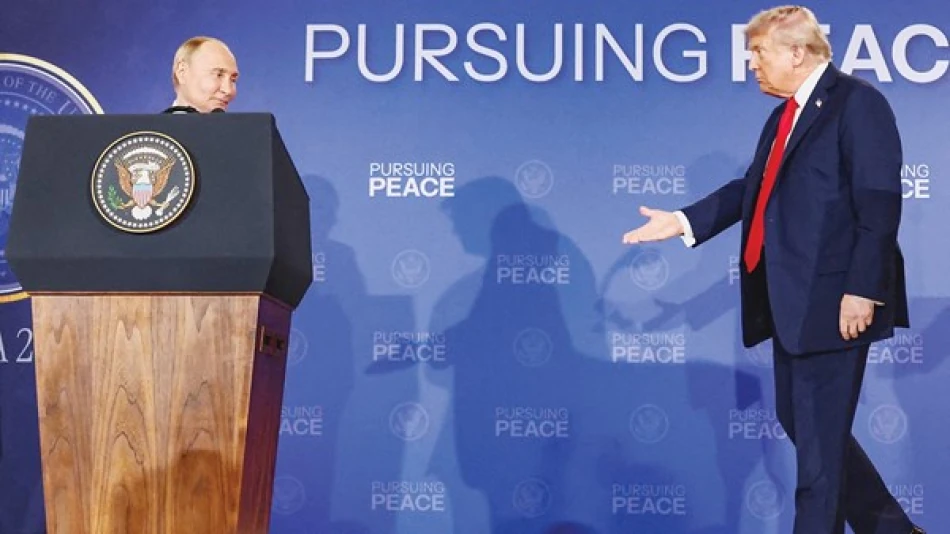
UAE Lauds Alaska Summit as Vital Step for Global Peace and Security
Trump-Putin Alaska Summit Sparks Diplomatic Breakthrough—But Ukraine Peace Remains Elusive
A three-hour meeting between Donald Trump and Vladimir Putin in Alaska has yielded the first concrete diplomatic progress in the Ukraine conflict since 2022, with both leaders agreeing to bypass ceasefire negotiations and pursue a comprehensive peace settlement. However, fundamental disagreements over territorial control and security guarantees suggest that any final agreement will require significant Ukrainian concessions that Kyiv may be reluctant to accept.
The Alaska Accord: A Strategic Shift
The summit, held in Alaska and welcomed by the UAE as a crucial step toward international stability, marked Trump's most significant departure from traditional Western diplomatic approaches. Rather than pursuing the gradual ceasefire-first strategy favored by European allies, Trump embraced Putin's preference for immediate comprehensive negotiations.
This tactical shift reflects Trump's transactional approach to foreign policy, prioritizing rapid resolution over the methodical pressure campaign that has defined Western strategy since Russia's February 2022 invasion. The decision to meet Putin without preconditions—the first US-Russia summit since the war began—signals Trump's willingness to engage directly with authoritarian leaders when he perceives strategic advantage.
Putin's Territorial Gambit
According to the Financial Times, Putin offered a significant concession during the talks: potentially moderating territorial demands in exchange for guaranteed control over Donetsk. The Russian leader proposed freezing current battle lines in southern Kherson and Zaporizhzhia regions while securing complete dominance over the strategic Donetsk area.
This represents a notable shift from Russia's maximalist position, which has historically demanded recognition of all four annexed Ukrainian regions. Putin's willingness to negotiate on roughly 40% of occupied territory suggests either genuine flexibility or tactical maneuvering to secure his core strategic objectives in eastern Ukraine.
The Donetsk Prize
Donetsk's importance extends beyond symbolic value. The region contains significant industrial infrastructure and provides crucial land corridors connecting Russia to occupied Crimea. Putin's insistence on retaining Donetsk while potentially yielding other territories reveals Moscow's strategic priorities: securing defensible borders and maintaining economic assets over maximizing territorial gains.
Ukraine's Impossible Choice
President Volodymyr Zelensky faces an excruciating dilemma ahead of his Monday White House meeting with Trump. While publicly supporting the proposed trilateral summit, Zelensky must balance international pressure for compromise against domestic expectations of territorial integrity.
Trump's blunt assessment—"Russia is a very big power, and they are not"—reflects the harsh realities constraining Ukrainian negotiating positions. Despite Western military aid totaling over $100 billion, Ukraine cannot indefinitely sustain current casualty rates and infrastructure destruction without risking societal collapse.
Security Guarantees: The Critical Variable
Zelensky's primary demand centers on ironclad security guarantees preventing future Russian aggression. However, the specific mechanisms remain undefined. NATO membership—Ukraine's preferred solution—faces Russian opposition and skepticism from alliance members concerned about automatic war triggers.
Alternative arrangements might include bilateral US security commitments, expanded weapons deliveries, or regional defense partnerships. Yet without credible deterrent capabilities, any agreement risks becoming merely a temporary pause allowing Russia to rebuild strength for future campaigns.
European Resistance and Strategic Divergence
European leaders' response reveals growing transatlantic tensions over Ukraine strategy. While Italian Prime Minister Giorgia Meloni and British Prime Minister Keir Starmer offered cautious support for Trump's initiative, their joint statement emphasized continued Russian pressure and rejected limitations on Ukrainian military capabilities or NATO aspirations.
This divergence reflects deeper strategic disagreements. European nations, facing direct security implications from Russian expansion, favor maintaining pressure until Moscow's complete withdrawal. Trump's America-first approach prioritizes conflict termination over European security architecture, potentially undermining decades of alliance coordination.
Market and Geopolitical Implications
Global energy markets have already responded to peace prospects, with natural gas futures declining on expectations of restored Russian supplies. However, sustained volatility seems likely given negotiation uncertainties and potential sanction modifications.
For investors, the summit signals possible commodity market stabilization and reduced geopolitical risk premiums. Defense contractors may face headwinds if peace materializes, while reconstruction opportunities in Ukraine could attract infrastructure investment.
The China Factor
Notably absent from public discussions was China's role in any settlement. Beijing's economic support has proven crucial for Russian war sustainability, yet Chinese involvement in peace negotiations remains unclear. Trump's transactional approach may require Chinese cooperation to ensure Russian compliance with any eventual agreement.
The Road Ahead: Realistic Prospects
Despite optimistic rhetoric from all parties, fundamental obstacles remain formidable. Putin's domestic political survival depends partly on demonstrating military success, while Zelensky faces potential domestic upheaval if perceived as surrendering territory for inadequate security guarantees.
The proposed trilateral summit represents a diplomatic opportunity, but success requires unprecedented compromise from all participants. Trump's leverage stems from American military aid control, yet his ability to deliver sustainable peace depends on crafting arrangements that address core security concerns for both Ukraine and Russia.
The next 48 hours will prove critical. Zelensky's White House meeting will likely determine whether diplomatic momentum continues or whether the Alaska summit becomes another failed peace initiative in Europe's most consequential conflict since World War II.
Most Viewed News

 Layla Al Mansoori
Layla Al Mansoori






